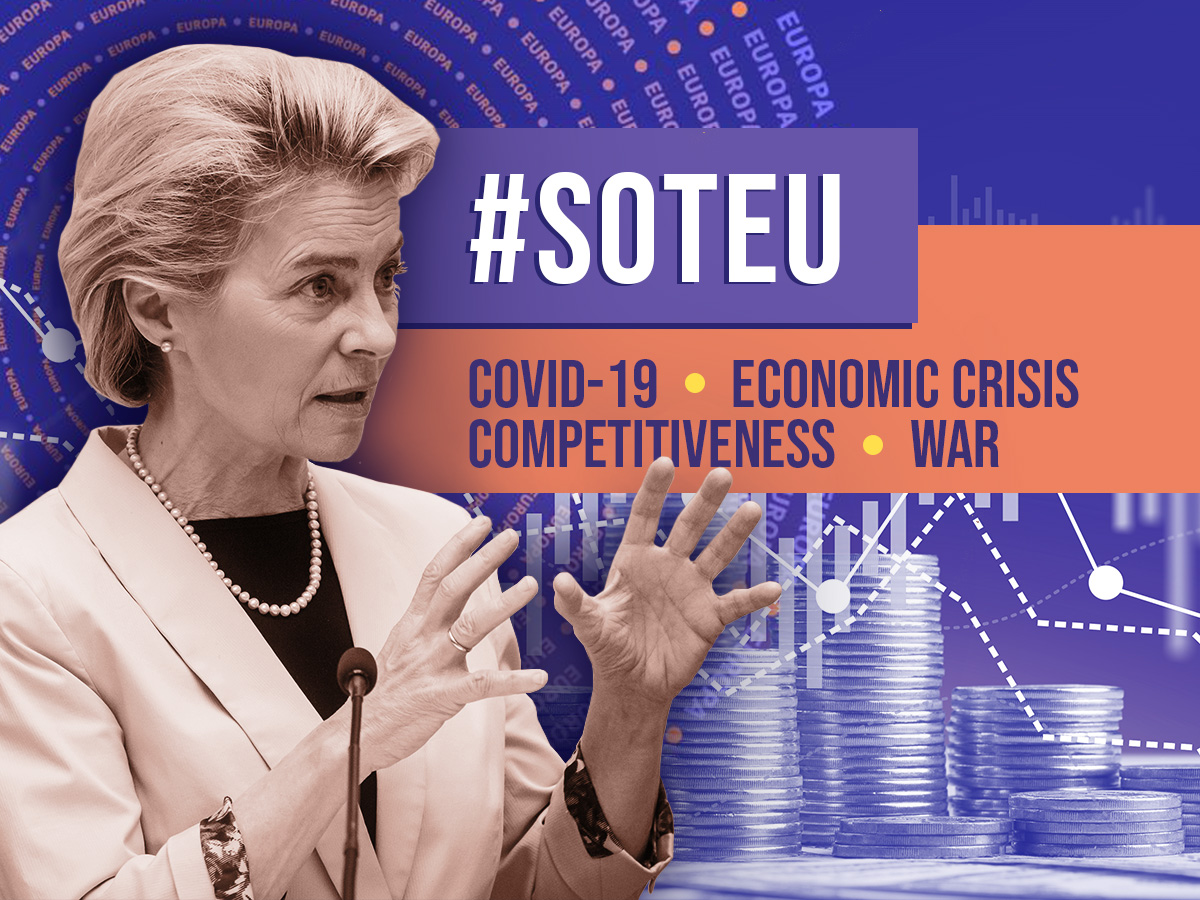The annual State of the Union (SOTU) speech delivered by the reigning Commission President should serve as a compass for showing the directions towards future goals for the European Union and take stock of past achievements. It was not the case this year when Ursula von der Leyen elegantly hushed up some failures of past while setting unreal ambitions for the upcoming period.
In mid-September Commission President Ursula von der Leyen made her last SOTU of her (current) mandate. She took up and held her position in an undoubtedly extremely challenging period. It started with the (mis)management of Brexit, continued with the global COVID pandemic and topped with the war in Ukraine. All these difficulties came with heavy by-products like the energy crises and the relative economic decline of Europe in relation to the US and China. Beyond question these challenges have all required some common response from the EU states.
While von der Leyen was concessive enough in her speech to praise the EU as a whole for its responses to the above mentioned problems, we probably all remember the amateur fumbling with the management of Brexit. We could also hardly forget the way Brussels tried to avoid chaos when it had to purchase vaccines at the peak of the pandemic. It just perfectly showed how the member states are left to themselves when a global challenge like this occurs. Following Russia’s invasion against Ukraine the EU showed political unity, but also became divided when it had to make decisions that hurt member states’ economy as well. Von der Leyen, as President of the Commission has had an arguably important role in all these matters.
As she described in her speech, she has ambitious plans for the upcoming years (however we still don’t know if she will run again or not). She underlined the importance of enlargement and also the protection of the economic interests of the EU. In reality however the situation seems to be the opposite. The EU’s internal market has evidently weakened and it cannot secure the welfare of the EU citizens anymore. This trend has only fastened up during the von der Leyen era while it should instead serve as the engine of enlargement processes. The motivation of expansion has always been the benefits for everyday people the European integration can offer, but this is something that is clearly missing at the moment.
The multiple crises the EU had to face during the past few years have proved that united responses are needed to effectively survive. However, these crises have also showed that the EU member states are sometimes left on their own and forced to deal with these problems individually. This kind of division is not only bad from political perspective, but also causes economic problems. To say the least, the EU most probably did not become a more attractive partner during these times.
Von der Leyen’s vision is somewhat misleading if we examine it from a bit closer. While the EU has been living from crisis to crisis with little sign of adaptation, she seems to be encouraging to have even bigger ambitions mostly on the global scene. It is though difficult to see how she imagines these external motivations when e.g. enlargement has radically slowed down if not completely stuck. What could definitely fasten up the EU’s overall competitiveness is actually a stimulated internal market. While it is perhaps a good thing that member states look for individual solutions to their challenges, it is definitely more vital for the EU to show a united perspective in these cases.
Von der Leyen talks about effectively protecting the EU’s economic interests while it seems like Brussels lacks a proper reaction to the growing economic rivalry of the US and China at least for the time being. She is certainly not in an easy position when it comes to a unified solution on economic challenges but the EU has kept losing some of its already damaged competitiveness because of Brussels’ hesitation.
One of the core problems is possibly the growing differences of opinions between the bigger and the smaller states of the EU and the gap is widening, especially since the COVID pandemic brought some increased and mostly unexpected economic troubles. Based on the fact that the bigger countries have usually better financial background to recover from a crisis, they can obviously fasten up their economy a lot faster than the smaller ones. This creates tension between the countries and the Commission seems to be basically given the green light to this development so the big countries benefit more while the smaller ones are slowly left behind. The on and off mentioned idea of multiple-speed Europe is probably not a solution, but the Commission should at least try to work on a tailor-shaped settling in reasonable cases.
When the EU is facing such challenges it makes little sense to talk about intensified global ambitions. The EU however wants to be a global player, but sincerely it couldn’t achieve such goals even when it had had much better economic capabilities. If they keep forcing these global ambitions, it will only lead to increased internal tensions. Most of Europe likely needs something else.
All in all, it might have sounded very optimistic and ambitious as von der Leyen described the past year and the upcoming period of the EU, but in practise we actually haven’t heard any promising idea regarding the solutions of the challenges already facing the EU. The political ambitions she explained are getting much further from the EU’s real economic power. First it is the internal market that should be put back on track and then we could think about greater ambitions.
